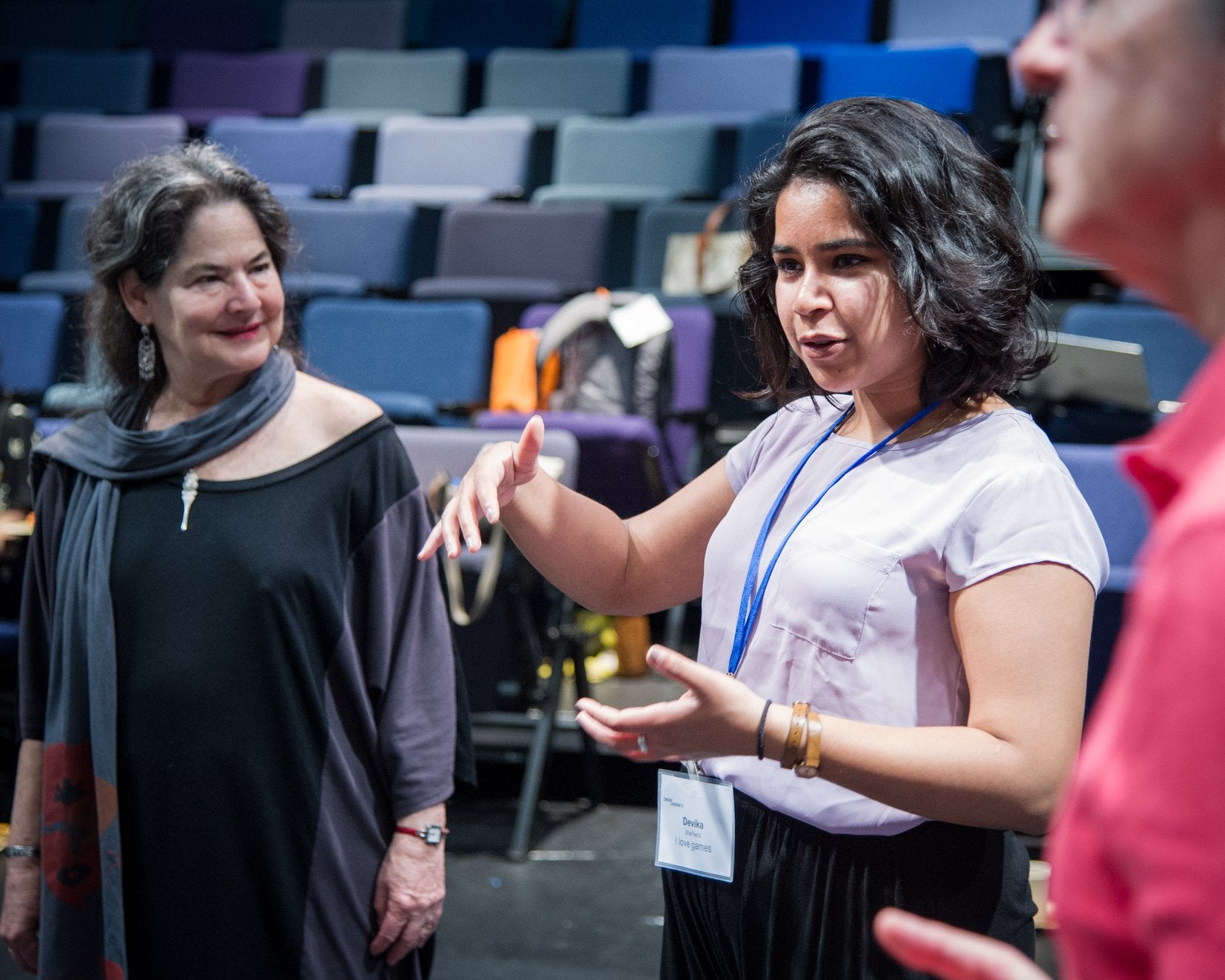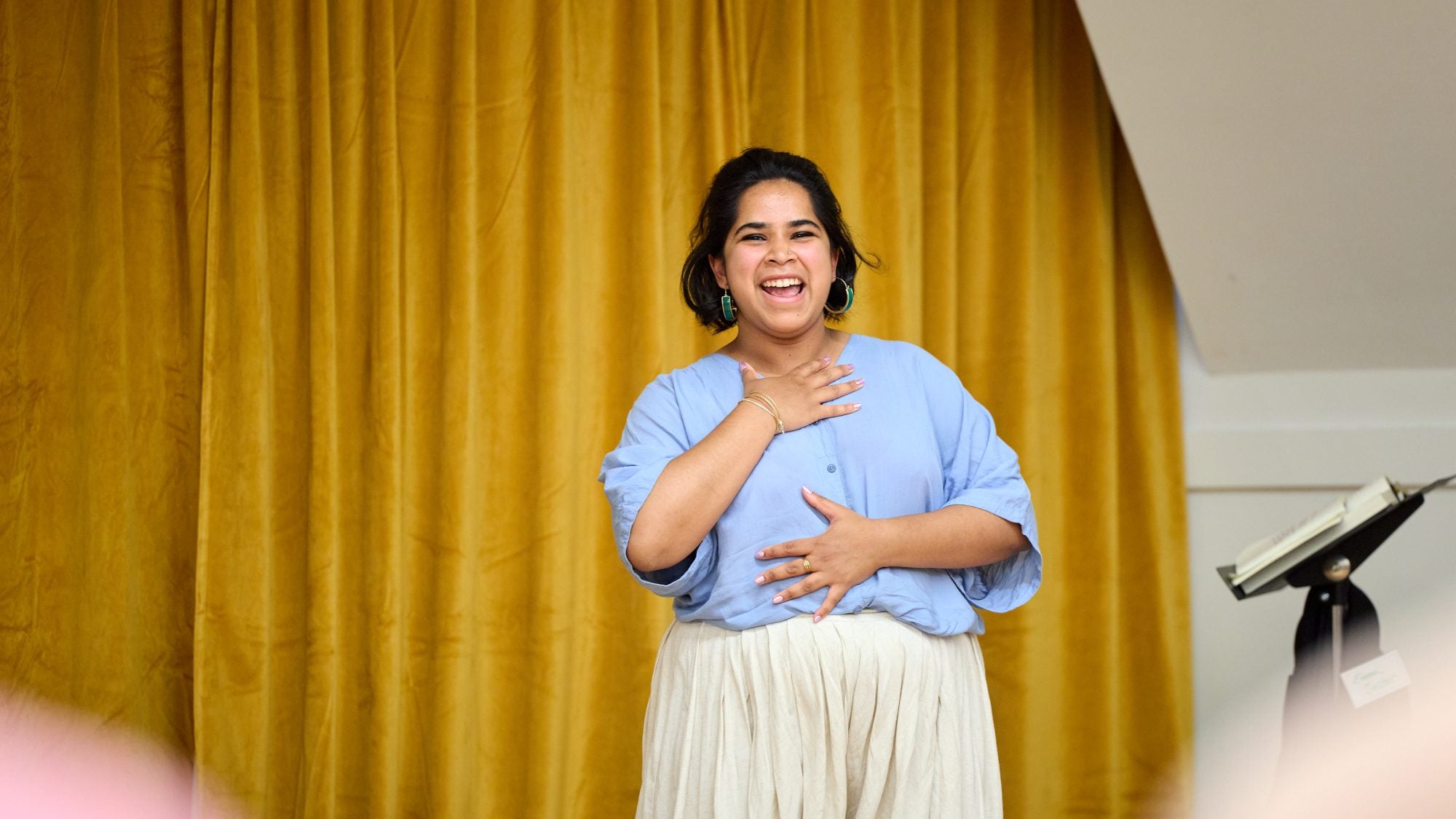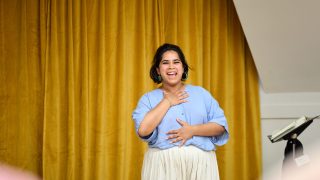Devika Ranjan (SFS’17), an advocate for migrants through theater performance, has been named to the 2025 class of Soros Fellows.
The Paul & Daisy Soros Fellowships for New Americans is a merit-based scholarship program for immigrants and children of immigrants pursuing graduate education in the U.S.
Ranjan is one of 30 Soros Fellows selected from a pool of more than 2,600 applicants nationwide. She will receive a $90,000 scholarship for her graduate studies.

“Devika Ranjan’s Soros Fellowship honors the heart of Georgetown’s mission: using scholarship, creativity and care to build a more just and connected world,” said Lauren Tuckley, director of the Center for Research and Fellowships. “Her time as a Marshall Scholar — an award for which our office proudly nominated her — deepened her commitment to ethical storytelling and migrant justice, setting the stage for the groundbreaking work she continues today.”
Ranjan joins more than a dozen Hoyas who have received the fellowship either during or after their studies on the Hilltop, following Celine Calpo (C’19), who received the scholarship in 2024 and is pursuing a law degree at New York University.
Ranjan will use her scholarship to continue her Ph.D. in performance studies at Northwestern University, studying the role of the arts in migration issues.
“I am so excited to be building on the work that was nurtured at the Lab for Global Performance and Politics and the Culture and Politics program, which started my work in critical and creative storytelling around migration,” Ranjan said. “Weaving practice-based work, scholarship and advocacy is all the more necessary now. I am so grateful to have been encouraged to pursue my wildest dreams through the interdisciplinary classes, international panel events, and faculty and classmate relationships that I still hold dearly from my time at Georgetown.”
A Childhood Filled With the Arts
Ranjan immigrated to the U.S. from Mumbai with her parents and brother when she was 3 years old.
From a young age, Ranjan immersed herself in the arts of her Indian heritage.
“When I came home from kindergarten, refusing to speak Hindi and forsaking my heritage, my mother reminded me that I come from Bollywood movies. We screened endless 90s romantic musicals,” Ranjan said. “I relearned my mother tongue from [Indian actor] Shahrukh Khan. I learned that color, dance and joy are essential even in the most tragic of stories.”
Ranjan remembers dancing to Bollywood hits, singing along to Broadway musicals with her family and performing in school musicals. While she loved the arts, her parents encouraged her to pursue them as a hobby, so she decided to go to Georgetown for its School of Foreign Service to train as a diplomat.
But she never left the arts behind. When Ranjan discovered the university’s Laboratory for Global Performance and Politics, she was enamored by its mission to encourage social change through the arts.
While at Georgetown, Ranjan explored participatory theater methods in conflict and post-conflict zones. She traveled to South Asia and created theater pieces with women along the India-Pakistan border suffering from border conflict and domestic abuse and facilitated performance workshops in Kathmandu for people affected by the major earthquake in Nepal in 2015. She was drawn to the power of theater to address global issues and create change.
“I was inspired by trailblazers applying theater methods for social justice around the world,” she said. “Rather than the elegance of diplomacy, I was enamored by working on the ground for change.”
Migration and Theater
After graduating from Georgetown, Ranjan continued her work at the intersection of theater and social justice, focusing on migration.
As a Marshall Scholar, she researched the effects of electronic surveillance on migrants in the United Kingdom, earning graduate degrees in sociology and applied theater from the University of Cambridge and the Royal Central School of Speech and Drama.
Since returning to the U.S., Ranjan has made teaching a core part of her work. She joined Georgetown as an adjunct professor during the 2020-2021 academic year to teach in the Department of Theater and Performance Studies.
She then worked with underserved high school students, many of whom came from immigrant backgrounds, through the Albany Park Theater Project in Chicago, a theater company that amplifies voices from immigrant and first-generation communities. She created ethnographic theater pieces centered on issues like family separation, labor rights and immigration.
“The performances we created never told the audience what to think. Rather, we allowed the power of narrative to do its work,” she said. “I root my justice-oriented mission to facilitate spaces of care, to meet migrants where they are and to create ethical, innovative migration storytelling.”

Ranjan is now pursuing her doctorate from Northwestern University, studying the role of theater in politics and continuing her graduate work on migration issues, specifically in the Chicago area.
At Northwestern, she works with immigration lawyers and English as a foreign language classes to host workshops and prepare migrants for their immigration legal proceedings. Ranjan also partners with Global Gardens Chicago, an organization that invites immigrants to grow their native agriculture in community gardens.
“I analyze the ways in which refugee farmers form connections with land, water and food through their agricultural work — both rooting themselves within the U.S. soil and maintaining their cultural connections,” Ranjan said. “I consider the ways in which urban farms can make space for immigrant and refugee livelihoods as a means of agency.”
Ranjan said her Soros Fellowship will empower her to continue her work in academia, theater and migration advocacy. She hopes to continue working with students while also bringing theater to nontraditional spaces, such as street corners and parks, to highlight the challenges migrants face.
“As we prepare for a new magnitude of migration because of the climate crisis, I will be positioned to help shape public perception of migrants, as well as harness theater tools to improve migrant realities,” she said. “The Soros community will nurture my ability to draw attention to urgent migration issues and develop my agility to move among policy, academia and the public.”


